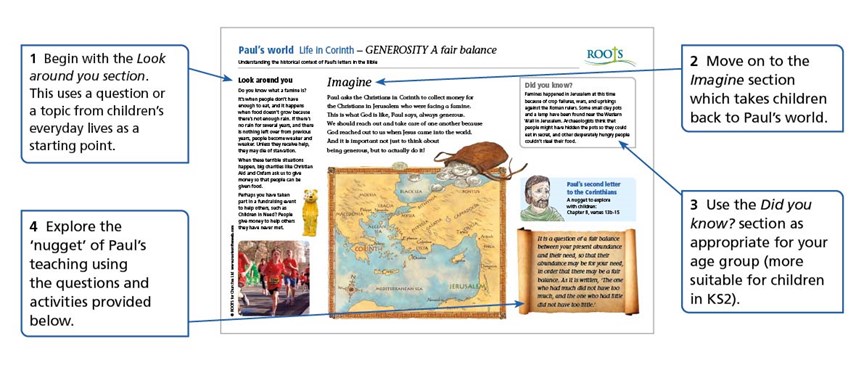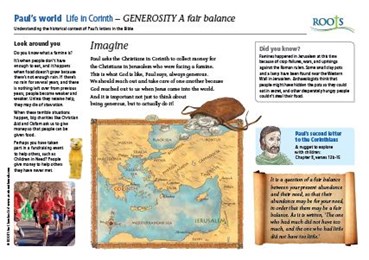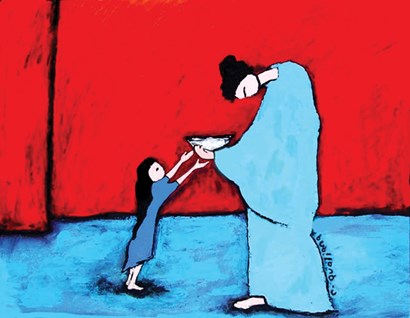Worship and learning for the whole Church – wherever you are
Resources for families with school-aged children to use at home
Welcome to #faith at home with ROOTS. We're delighted to be part of the Church of England's #faithathome initiative working with Oak National Online Academy.
A fair balance
2 Corinthians 8.7-15
Material for primary-aged children
A prayer and activity to introduce the theme.
Prayer
Response line: We are sorry. Help us to change.
Lord Jesus, for the times we do not pull our weight.
We are sorry. Help us to change.
For the times we are lazy…
For the times we let others do our share of the work…
For the times we do not play our part…
Amen.
Seesaw balance
An activity to help the children think about making things fair.
Everyone draws a picture of themselves, puts their name underneath, and cuts it out. Clear some space on the floor, and put a cushion in the middle. An adult stands to one side of the cushion. Who could go on the other side to balance the weight of the adult, as if you were on a large seesaw? Play around with different combinations of people on each side and discuss whether you would be able to balance. Talk about how it's no fun on a seesaw if the sides don't balance. Life can be like that if things are too imbalanced or unfair.
Paul's world
Download and use the Paul's world sheet to understand the historical context of Paul’s letters.

Talk together to connect faith with everyday life
Why did Paul want the Corinthians to give their money away?
What was the last thing you shared with someone?
How can our generosity affect the world we live in?
A balanced debate
Decide which charities to support
You will need: play or real money, e.g. £20, websites or pamphlets about a few varied local/overseas charities, e.g. animals, children, health, (optional), writing paper and pens.
- Divide into two groups, if possible. Give each group some charity information and half of the money. Encourage the group members to talk about which charity they would like to give the money to, and why. Say that the money can only be donated if everyone in the group agrees.
- Ask the groups to report back on their decisions.
- If you decide to make a real donation, involve the children in writing an explanation of why you're giving money, on the online donations page.
Spend, save and give jars
Work out what to do with the money you have
You will need: three clean empty jam jars with lids, sticky labels, felt tips.
- Talk about where the children receive money from, e.g. pocket money, birthday presents, money for chores done at home. Introduce the principle of giving money to charity, as well as spending it and saving it up for ourselves.
- Together, make three separate labels with the words Spend, Save and Give, one word on each label, and decorate the rest of the label.
- Stick the labels on three jars (ideally a set for each child), and ask the child/children to decide what they're going to spend, save and give and put their money into the jars.
Generosity journals
Record giving and receiving generosity
You will need: a blank notebook or a few pieces of paper stapled together, one per child, pens and felt tips.
- Give everyone a notebook and invite them to write ‘My Generosity Journal’ on the cover and personalise it.
- Talk together about what to record in their journals, e.g. things they do for others, examples of people being generous to them.
- You could set them a generosity challenge for the week, e.g. offer to help at least one person per day without being asked, or try and make someone smile before lunchtime!
- Look at the journals together once a week to see how everyone has been giving and receiving.
Material for secondary-aged children
Based on 2 Corinthians 8.7-15
Download the Paul's world sheet to read background and introduce the theme.

Starting point
Put the following in order of generosity from most to least: buy you a drink, give you a lift, let you use my phone, like your Facebook post, help you with your homework, lend you a DVD, text you, smile at you.
Crowdfunding
Design a poster, or an online advertising campaign, to raise funds in line with Paul’s attitude and message. You might want to consider these questions:
- How does Paul persuade people to give?
- What guidance does he give on how much to give?
- How can Paul’s words inspire us today?
More equals less
Place a set of dominoes face down. Invite everyone to take one, look at their domino and decide whether to keep it or swap it. Don’t explain or answer questions. Then produce a bag of sweets and give to each person a number of sweets equal to 12, minus the number of spots on their domino, e.g. a person with 6 spots gets 12-6 = 6 sweets. How do they react?
Drama: A fair share
Sam, Jaz and Nicky are at their after-school/youth club.
Props: A low table with a bowl on it containing seven snack-sized chocolate bars.
Sam and Jaz walk in.
Sam: Oh, look there’s some chocolate.
Jaz: (looking around) There’s no one else here, so let’s share them.
Sam: Right (starts sharing them out). Two for me, and one for you. Now there’s four left, so that’s two more each.
Jaz: (looks carefully at the sweets in Sam’s hand and then at the sweets in his/her own hand). That’s not fair! You’ve got four, but I’ve only got three!
Sam: I get extra for sharing them out.
Jaz: But you’ve got more than me.
Sam: Well… I’m older than you.
Jaz: So what?
Sam: Well …I’ve been coming to the club longer than you have.
Jaz: So what? I’m stronger than you, I could just take them from you.
Sam: Don’t you dare! I’ll tell, and then you’ll be in trouble.
Nicky: (walking in) What are you two arguing about?
Jaz: We found some chocolate bars, but Sam won’t share them out fairly.
Nicky: If you can’t share them between you, then give some to me.
(Sam and Jaz look at the sweets, then at each other and think).
Sam: That won’t help. There are only seven chocolate bars, so we can’t share them fairly between three people.
Jaz One of us will always have more.
Nicky: I’ve got an idea.
Sam: Go on, tell us.
Nicky: What if we decide that having one bar each is enough? I know someone who never gets given chocolate to share with friends, and they never have any pocket money to buy their own.
Jaz: We could give them the rest.
Sam: Well, perhaps that is a good idea.
Nicky: So we’re agreed?
Sam and Jaz: (together) We are!
Picture reflection

- Is the child giving or receiving?
- Do you find it easier to give or to receive?
Listen to...
No Man Is An Island, Tenth Avenue North on Cathedrals
Last week 19-25 June we explored Kindness.
Next week 3-9 July we explore Vulnerability - find a variety of resources from ROOTS.
Back to the #faithathome with ROOTS landing page.
Find more ROOTS at home resources for families worshipping together while schools and gatherings are suspended.